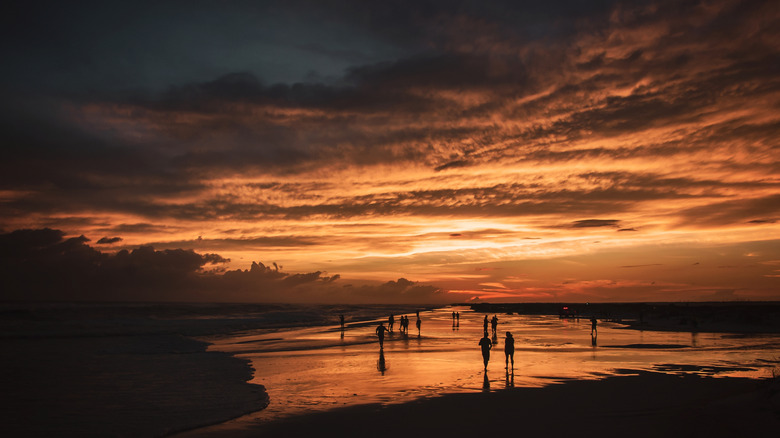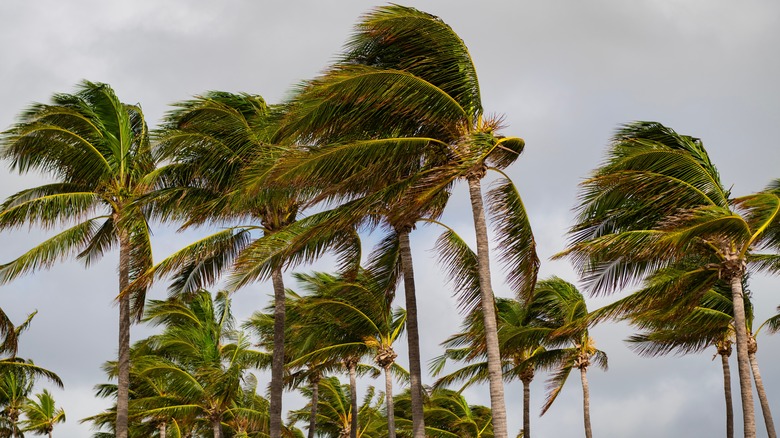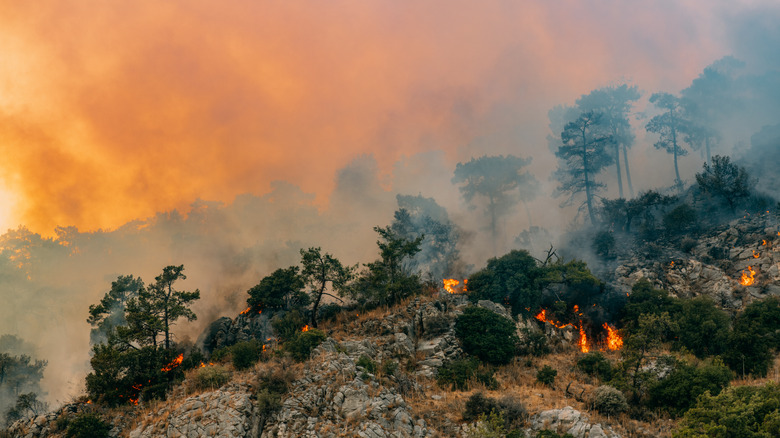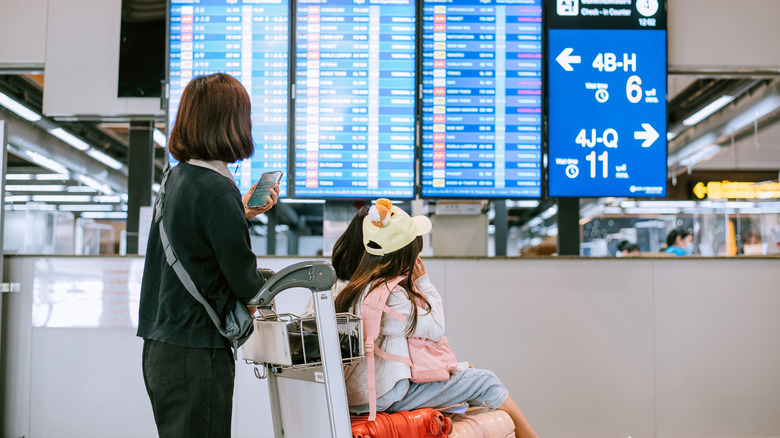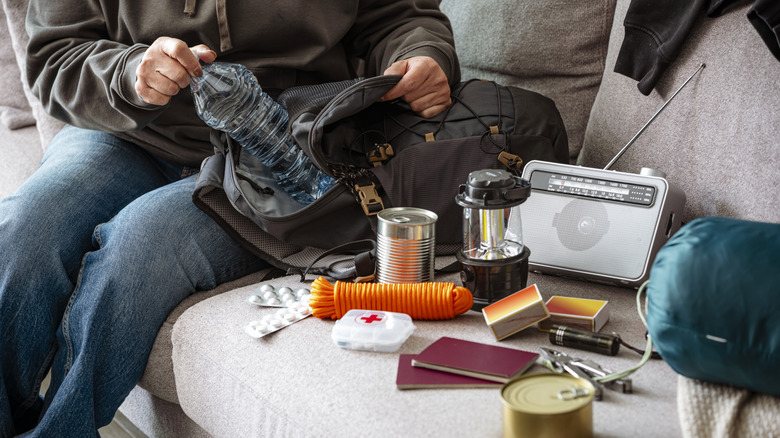The Best Travel Safety Tips For When A Natural Disaster Threatens Your Vacation
Maybe you planned your summer vacation in Cancun for August, the heart of hurricane season. Maybe you just touched down in Hawaii and are getting ready to hit the beach when you hear there's a tsunami warning. Maybe you just started a hiking trip through the forests of California during a particularly dry September and smell a little smoke on the wind. Natural disasters can strike at any time, leaving devastation in their wake. You may be wondering: If there's any chance a terrible storm or emergency situation may hit while you're on your trip, what do you actually need to do to give yourself the best chance of a fulfilling travel experience, and more importantly, to stay safe?
To find out what travelers should do when they realize their vacation may be impacted by a natural disaster, Islands spoke to Victoria Fricke, the owner of luxury travel agency Vic's Vacations which specializes in creating custom itineraries and handling trave; logistics for clients. Her main piece of advice: "Stay calm and look for plans B, C and D."
Fricke is no stranger to this issue. She shared that she has worked with clients whose trips were threatened by fires, tsunamis, and most frequently, hurricanes. Across the board, she said, her clients have had to cancel unsafe plans, change trip dates, and shelter in place until the danger passed. During the Maui wildfires in 2023, Fricke said she had to help clients who were in the path of the disaster, sharing, "We had to evacuate them to another island, find a hotel on that island and work to find new air days later as the airlines were inundated and we couldn't get one out immediately."
What you can do to prepare for natural disasters while planning your vacation
Some natural disasters are extremely unpredictable. While you may know that Japan has a high chance of earthquakes, you can't really plan your trip to Osaka to avoid them. All you can do is be prepared and know what to do in an emergency. That's not true of all natural disasters, however. According to Victoria Fricke, hurricanes are the most common natural disaster experienced by the travelers she works with, especially those headed to the Caribbean between June and November. Hurricanes are a lot more likely to occur during hurricane season, so travelers going to affected regions should be prepared. While there are significant deals on flights and hotels during this time, those savings come with risks.
If you decide to book a trip to a destination with a higher chance of being impacted by natural disasters, Fricke says you definitely need travel insurance. While it can be expensive, it may save you money in the long run. Although you'll have to wait to be reimbursed for covered expenses, it's far better than ending up stuck with a serious, unexpected bill.
Fricke recounted a story about clients who had to extend their trip due to a hurricane. "My clients were reimbursed for the cost for their hotel room those extra nights, their friends on property without insurance weren't," she told Islands. "The insurance cost they had paid was $180 for their trip. The cost of the three nights was about $2,000."
Stay calm and get informed if you hear that a natural disaster is coming
If you've already arrived at your destination and find out that a major storm, wildfire, or other natural disaster may be about to hit, you're probably going to feel overwhelmed, if not terrified. Not only are you at risk of missing out on the trip you have been dreaming of for ages and losing significant money by changing plans, but you and your loved ones could also be in serious danger. As stressful and upsetting as the situation may be, Victoria Fricke urges travelers to stay calm. Then, it's time to gather information from trusted sources.
As scary as the situation is, it's important to listen to the right people when it comes to information about natural disasters. While others around you may be feeling panicky, Fricke recommended: "Listen to local authorities and weather outlets to determine when the storm will hit ... Don't allow social media, speculation from non credible sources or other tourists allow you to panic. The best thing you can do is calmly wait to hear what local authorities and resort staff inform you to do."
Change your flights as quickly as possible
While you may be tempted to wait and see what's going to happen, Victoria Fricke says that when it comes to flights out of areas facing natural disasters, there is no time to waste. Otherwise, you may find yourself scrambling to figure out the best thing to do if your flight is canceled due to weather — alongside everyone else who decided to take a vacation that week.
If you think there's any chance your flight out of your destination may be canceled, you should change your plans immediately. You will probably have to extend your trip either way, and if you wait until your flight is actually canceled, you could end up spending a lot more. Fricke explained: "If this happens keep in mind they are modifying all passengers, not just you. That means it could take days to get on a new flight. As soon as you know the potential hit, modify your flight to one to two days after ... Moving ahead guarantees a seat on a flight vs hoping you get one."
Depending on the situation, if you want to lave the area quickly and cut your trip short, that could be possible, too. Fricke shared that in the past, she was able to help multiple clients get out of the path of a hurricane before the storm even hit by encouraging them to make a fast decision. She explained that the key is always making the change early, "Whether it's departing from your trip earlier than planned to avoid the threat all together or finding a new flight a couple of days later after the weather has calmed down," she advised.
What to do if you have to ride out a natural disaster
If a natural disaster is coming and you have heard from reputable sources that you should shelter in place rather than evacuate, there are still things you can do to stay safe and improve your experience. Before anything else, Victoria Fricke advises plugging in your phone, laptop, or tablet and making sure you're able to stay connected in the event that you lose power. Not only will this help prevent boredom, but it will also allow you to communicate with loved ones and stay informed about what to do and how long the disaster may last.
If you have enough advance warning, Fricke recommends stocking up before the disaster begins and before local shops close up for safety. She suggests picking up some water and snacks, just in case you can't go out for a while. Don't go overboard, though. Fricke cautioned: "Don't allow fear to push you into being an inconsiderate person- just go grab some supplies for an overnight and missed meal if needed."
